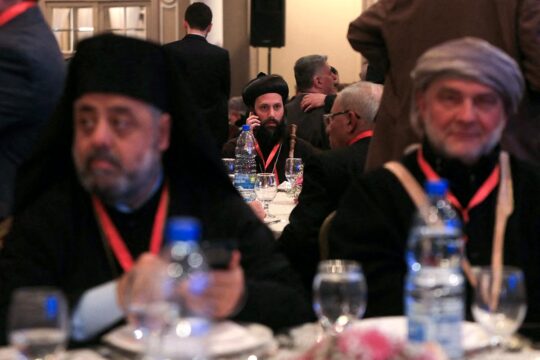Thousands of traumatised Syrians left the rebel enclave of Aleppo Monday as the UN voted to deploy observers there and said it planned new peace talks in Geneva in February.
"It is the intention of the United Nations to convene those negotiations in Geneva on 8 February 2017," UN envoy Staffan de Mistura said after the Security Council unanimously adopted a French-drafted resolution to monitor evacuations from Aleppo, with Russia's backing.
But in Moscow, President Vladimir Putin said after Russian ambassador to Turkey Andrei Karlov was shot dead by a policeman in Ankara that the killing could "disrupt" the peace process in Syria and harm Turkish-Russian ties.
Damascus denounced the "despicable" murder of Karlov, who a witness said was shot dead by a gunman who shouted "Aleppo" and "revenge".
James Nixey, head of the Russia and Eurasia programme at think tank Chatham House, said the diplomat's murder could affect Aleppo evacuations.
Families in Aleppo had spent hours waiting in below-freezing temperatures, sheltering from the rain in bombed-out apartment blocks and waiting desperately for news of a new wave of departures.
After an agonising delay, the operation resumed under a complex agreement that will see regime forces exert full control over Syria's second city.
- 'Huge crowd' -
Buses transported more than 7,000 people out of the city, said Ingy Sedky, spokeswoman for the International Committee of the Red Cross (ICRC).
She said the evacuations were expected to continue overnight.
"There are still thousands -- it's a huge crowd, women, children," she said.
The evacuees included seven-year-old Bana al-Abed, whose Twitter account had offered a tragic account of Syria's nearly six-year war, as well as 47 children who had been trapped in an orphanage.
Ahmad al-Dbis, who heads a team of doctors and volunteers coordinating evacuations, saw dozens of buses and ambulances arrive at the staging ground west of Aleppo.
He said the evacuees were in "a very bad state after waiting for more than 16 hours" at a regime checkpoint without being allowed off the vehicles.
The government had suspended evacuations on Friday, insisting that people also be allowed to leave two northwestern villages under rebel siege.
The ICRC and the Syrian Observatory for Human Rights said around 500 people left in a dawn convoy out of Fuaa and Kafraya.
The Britain-based Observatory said at least 14,000 people, including 4,000 rebels, have left the opposition sector since the evacuations began on Thursday while at least 7,000 remain.
- Sub-zero temperatures -
A rebel representative said hundreds of people would also be evacuated from Zabadani and Madaya, two army-besieged rebel towns near the border with Lebanon, as part of the deal.
Dbis said the Aleppo evacuees' departure was delayed for hours in sub-zero temperatures, compounding their plight from months of siege and army bombardment.
"They hadn't eaten, they had nothing to drink, the children had caught colds, they were not even able to go to the toilet," he said.
He described families wrapped in several layers of coats getting off the buses, which then headed back to Aleppo to bring out more.
The UN's children agency UNICEF said some of the children rescued from the orphanage were in critical condition because of injuries and dehydration.
"Many vulnerable children -- including other orphans and children separated from their families -- still remain in east Aleppo and need immediate protection," it said.
The Humanitarian Relief Foundation, a Turkish NGO working in Syria, said young blogger Bana had arrived at a camp for displaced persons in the northwest province of Idlib.
The Turkish news agency Anadolu posted a short interview with the girl, dressed in a warm coat and hat against the winter chill.
"In Aleppo the shelling was all over the place. We got out from the ruins because our house was bombed," she said shyly in Arabic.
- Blistering assault -
Residents of east Aleppo -- a rebel bastion since 2012 -- had already lived under four months of suffocating siege when Syria's army began its blistering assault in mid-November to retake the whole city.
"The people we are welcoming have been through hell -- the level of trauma they have experienced is impossible to describe or comprehend," said Casey Harrity of the international NGO Mercy Corps.
In an 11th-hour deal, regime ally Moscow and rebel supporter Ankara agreed on the evacuation of thousands of civilians and fighters from the last remaining opposition-held pocket in Aleppo.
Moscow, which has carried out an air war in support of the Syrian regime since September 2015, had threatened to veto the Security Council draft resolution calling for monitors to oversee the protection of civilians.
But on Monday, the council unanimously adopted the French-drafted text in the first show of unity in months among world powers grappling with the crisis.
The measure tasks the UN with carrying out "adequate, neutral monitoring and direct observation on evacuations from eastern Aleppo and other districts of the city".
Arab foreign ministers welcomed the resolution, the 22-member Arab League said in a statement following an emergency meeting in Cairo over Aleppo late Monday.
The foreign and defence ministers of Russia, Turkey and Iran are set to meet in Moscow on Tuesday to discuss Syria.



